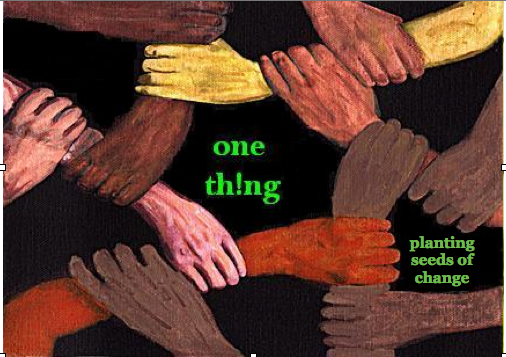Check out these great excerpts from YES! magazine, a publication devoted to solutions:
 The pot-in-pot cooler uses the evaporative power of water to draw heat energy away from the contents. In Nigeria, where 90 percent of villages have no electricity, these pots preserve tomatoes for 21 days instead of two or three days.
The pot-in-pot cooler uses the evaporative power of water to draw heat energy away from the contents. In Nigeria, where 90 percent of villages have no electricity, these pots preserve tomatoes for 21 days instead of two or three days.In a well ventilated dry area, place a small clay pot inside a larger clay pot. Fill the space in between them with wet sand and keep it moist. Cover the top with a cloth. Store produce in the inner pot.
As the water evaporates, it pulls heat out with it, making the inside pot cold.
From an article on how to build Resilience into a community:
1. Build skills. Many transition initiatives start with learning and teaching skills that are valuable to yourself and others, and that can be practiced without harm to people or nature. If you can repair something, make something, or grow something, offer first aid or do low-tech mechanics, raise farm animals or rig up a solar oven, you can meet some of your immediate needs and swap with neighbors.
Also essential are the interpersonal skills that help people work together to get things done and to resolve conflicts.
2. Learn to live within local means. Work toward replacing products and services brought in from long distances with things you can do, make, harvest, or repurpose locally. Consider introducing small-scale animal husbandry, nut and fruit trees, and food processing facilities. Develop local, clean sources of energy. Help restore natural systems so they can be productive and resilient into the future. Use resources frugally and efficiently, and design things to last and to be reused or repurposed.
Include culture and entertainment, and provide opportunities for local artists and performers.
Set it up so people with little cash are included from the start. Develop means to barter, swap, and share. This will help restore your community’s economy, keep the flow of wealth local, and include the unemployed and low-wage workers. This is a good time to look around and notice who your neighbors are, and to begin building systems of mutual support. This collaboration doesn’t need to be framed by dire warnings about the collapse of civilization. It can be as simple as sharing tools, planting a garden together, or holding a neighborhood potluck. If you start by reaching across class and race lines and across “culture war” divides, you will build a strong foundation for action. When things get difficult, the person who can offer the most may be the guy you argue with about politics but who knows how to fix things. Or it could be the young woman who knows how to bring people together in a song, or the grandmother who remembers how things used to be made by hand.
3. Imagine, adapt, celebrate. Building your personal resilience will increase the chances that you can help loved ones and the broader community during difficult times.
Get physically fit and healthy, and minimize dependence on high-tech medicine and pharmaceuticals.
Get out of debt.
Hone your ability to observe and think for yourself—turn off the pundits, talk to your neighbors, and make up your own mind.
Build a tolerance for uncertainty. A spiritual practice or a calming practice can help you remain centered in times of rapid change.
This may be a time of change, but it needn’t be a time of despair. After all, the enormously expensive (and destructive) way of life we have been living did not bring much happiness or health. By putting life-giving values first, we could well find more rewarding ways of living.
You can begin building more joyous ways of life by making the resilience work itself come alive. Encourage imagination and creativity. Have parties. Create liberated spaces. Celebrate at the drop of a hat. Communities throughout the world share music, dance, and storytelling, in secular and sacred contexts. From Appalachian square dances to Mardi Gras parades, from Native American Sun Dance to holy communion, gatherings and celebrations are the glue that hold a community together.









